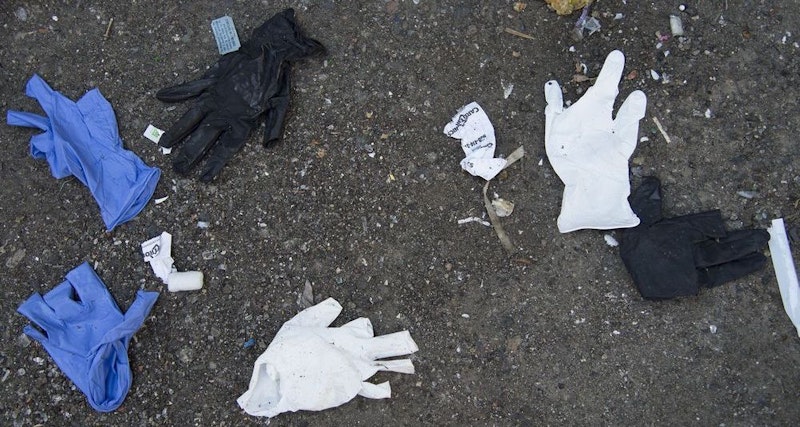A friend of mine, after stopped in the street because she wasn’t wearing a COVID-19 mask, asked the man in the truck: “Do you run, sir? Do you know what it is to run, without being able to breathe, when it is ninety degrees outside?”
I’m legally required to wear a mask in public places, and everyone I meet is wearing one.
The masks are often beautiful; many of them are hand-made, by family members and friends, and mailed from everywhere to everywhere. More women are engaged in making and mailing masks than men. This is not simply because women know more about sewing. They also know more about not going through life saying “threads” and “weaving together” and referencing “tapestries” and “homespun” (things) and “embroidered” (tales) without the faintest idea what one is really talking about.
The mask rips the veil off the attitude we take towards strangers. We come to public places expecting to be infected, and afraid of everyone else there. But we were also urged not to wear masks in order not to lose our fear of being infected, thereby taking undue risks. The mask is the trap of confidence in political pronouncements. The same person who was formerly proud of eschewing masks is now upset to see other people walking around with their mouths uncovered. He gets his confidence from the news; it doesn’t matter if the news contradicts itself. Stocks rise and fall according to what the news precipitates, and then the rise and fall becomes news.
Strangers are dangerous to us because our bodies are made the same way, and are vulnerable to the same disasters. What happened in China yesterday will happen in Ohio tomorrow. The mask is the anti-flag.
Strangers are not sources of infection; our own bodies infect us and sicken us because the virus plants seeds of strangeness in them. We’ve no idea how severely the virus will visit us. The fear of the stranger begins with our own ignorance about our own bodies, which we’d prefer not to dwell upon.
The best kinds of masks are N95 masks, which protect the breather from the virus, and there aren’t enough of them. Most masks don’t work very well. It’s unclear whether you’re wearing a mask to protect yourself or others. Part of the meaning of wearing a mask is that we’re straining to find something meaningful to do about the coronavirus. There’s very little real protection against it.
Identities are muffled by masks. It’s necessary to strain when speaking. I went to the post office, and had to show by my tone of voice that I meant well and intended to be polite. People share masks when there aren’t enough of them, although this defeats their purpose to a significant extent. I wore a mask that was coated, on the backside, with lipstick. So clearly people are wearing both lipstick and a face mask. Underneath, the same routines: smoldering, devoid of purpose.
One friend of mine was given a mask with pictures of Darth Vader’s mask on it. “Take that ridiculous thing off,” Snoke tells Kilo Ren, who is imitating Darth Vader. Translated from Chinese and Latin, “Kilo Ren” means roughly “a thousand people.” Do not be one of a thousand people is the message. Be yourself. Of course, your undisguised face is the mask you wear to your Zoom meetings. “I am healthy and well,” says your unguarded face. “I am certainly not crying in the prison of my apartment. After all, what is there to cry about? I am not sick.”
People are making masks for the deaf. The masks have little windows in them, which makes sense. The little windows are magical. They allow the deaf to read our lips when we, wearing completely opaque masks, speak aloud. Pictures of the masks with the little windows go up on Facebook. Facebook has added a “care” emoji you can use when responding to such posts. It can even be seen by the blind.
When the disease becomes treatable, people will discard their masks. They’ll untie them and forget about them, except for those odd moments of remembrance, when old panic shows up in photographs. I want to show your fear in a handful of cloth. I want to say that I’ll keep wearing my own mask, as a protest, or that it’s wrong to ache for an unmasking as “things get back to normal.” But I’ll take off and discard my mask too. Joy is contagious, and relief is a species of joy. I’m not wearing a mask to protect you or me. I’m wearing it because it’s the price of admission to this masquerade where we all join together, in fearless celebration, in illusion, once the long night of distance and caution is over and we are at liberty—to live, to be normal, letting daybreak make fools of us again.

